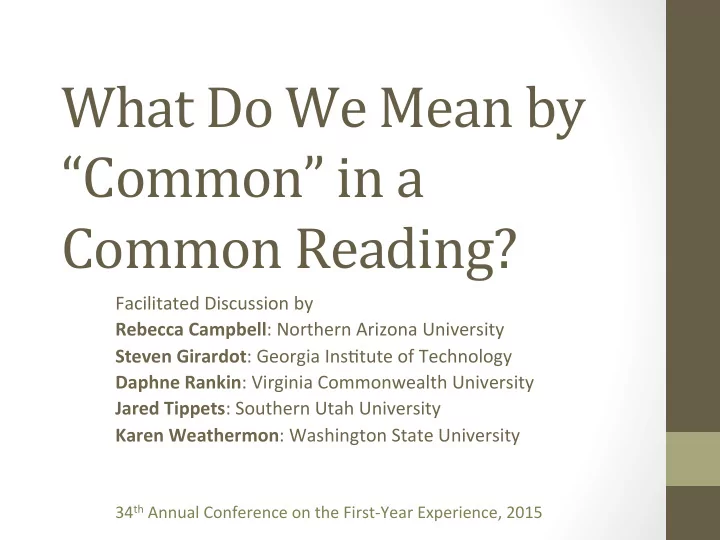

What ¡Do ¡We ¡Mean ¡by ¡ “Common” ¡in ¡a ¡ ¡ Common ¡Reading? ¡ Facilitated ¡Discussion ¡by ¡ Rebecca ¡Campbell : ¡Northern ¡Arizona ¡University ¡ Steven ¡Girardot : ¡Georgia ¡Ins<tute ¡of ¡Technology ¡ Daphne ¡Rankin : ¡Virginia ¡Commonwealth ¡University ¡ ¡ Jared ¡Tippets : ¡Southern ¡Utah ¡University ¡ Karen ¡Weathermon : ¡Washington ¡State ¡University ¡ ¡ ¡ 34 th ¡Annual ¡Conference ¡on ¡the ¡First-‑Year ¡Experience, ¡2015 ¡
The ¡Context: ¡Some ¡questions ¡ “ What ¡are ¡colleges ¡seeking ¡from ¡[the ¡ emerging ¡canon ¡of] ¡books? ¡ ¡What ¡is ¡this ¡ common ¡language ¡we ¡want ¡our ¡college ¡ students—not ¡to ¡say ¡citizens—to ¡share?” ¡ ¡ ¡ -‑-‑Jennifer ¡Finney ¡Boylan, ¡“A ¡Common ¡Core ¡for ¡All ¡of ¡Us,” ¡ New ¡York ¡Times ¡Op-‑Ed, ¡March ¡2014 ¡ ¡
“Common” ¡seems ¡simple, ¡but ¡ • if ¡we ¡aren’t ¡clear ¡about ¡the ¡“common” ¡goals ¡of ¡ our ¡programs, ¡we ¡create ¡opportuni<es ¡for ¡ frustra<on, ¡dissension ¡and ¡controversy; ¡ • and ¡the ¡predominate ¡discussion ¡becomes ¡about ¡ book ¡selec<on ¡rather ¡than ¡about ¡what ¡our ¡ campus ¡does ¡with ¡a ¡book ¡to ¡advance ¡those ¡ goals. ¡ ¡ ¡ What ¡DO ¡we ¡mean ¡by ¡“common”? ¡ ¡And ¡can ¡this ¡ ques<on ¡point ¡the ¡na<onal ¡discussion ¡and ¡our ¡ own ¡programs ¡in ¡new ¡direc<ons? ¡
Some ¡Possible ¡DeJinitions ¡ 1. Advancement ¡of ¡ a ¡shared ¡set ¡of ¡values ¡or ¡ cultural ¡touch ¡points, ¡ which ¡places ¡the ¡ primary ¡focus ¡on ¡the ¡book ¡selec<on. ¡ ¡ The ¡National ¡Association ¡of ¡Scholars ¡assumes ¡this ¡ deJinition ¡and ¡encourages ¡the ¡adoption ¡of ¡classic ¡works. ¡ They ¡note ¡with ¡alarm ¡the ¡common ¡reading ¡“industry” ¡of ¡ “recent, ¡trendy, ¡and ¡intellectually ¡unchallenging ¡books” ¡ that ¡“frequently ¡emphasize ¡progressive ¡themes” ¡or ¡serve ¡ “as ¡an ¡excuse ¡to ¡promote ¡political ¡agendas.” ¡ ¡ Beach ¡Books: ¡2013-‑14 , ¡ What ¡Do ¡Colleges ¡and ¡Universities ¡ Want ¡Students ¡to ¡Read ¡Outside ¡Class? ¡ pp. ¡5, ¡22. ¡ ¡
¡ 2. ¡ Introduc<on ¡to ¡ common ¡expectaBons ¡of ¡ an ¡academic ¡community , ¡which ¡places ¡ emphasis ¡on ¡the ¡messaging ¡that ¡ accompanies ¡the ¡book. ¡ ¡ • What ¡are ¡the ¡common ¡expectations? ¡ ¡ ¡ • How ¡and ¡to ¡whom ¡are ¡these ¡expectations ¡ communicated? ¡
3. ¡ Shared ¡behavior ¡or ¡experience ¡ that ¡ creates ¡ ¡a ¡sense ¡of ¡community, ¡affilia<on, ¡ or ¡belonging. ¡ ¡ • How ¡is ¡this ¡commonality ¡communicated ¡and ¡ fostered? ¡ ¡ • What ¡participation ¡or ¡contact ¡with ¡the ¡book ¡is ¡ required? ¡ ¡What ¡is ¡encouraged? ¡ ¡
4. ¡ Shared ¡intellectual ¡space ¡to ¡which ¡ various ¡sectors ¡of ¡a ¡university ¡bring ¡their ¡ perspec<ve ¡to ¡a ¡common ¡topic ¡or ¡problem. ¡ ¡ • Where ¡and ¡how ¡are ¡multidisciplinary ¡and ¡ integrated ¡thinking ¡about ¡a ¡common ¡text ¡ developed? ¡ • How ¡is ¡this ¡communicated, ¡and ¡to ¡whom? ¡ ¡ ¡
Some ¡Questions ¡to ¡Consider ¡ 1. What ¡is ¡your ¡campus’s ¡defini<on ¡of ¡“common” ¡ within ¡your ¡common ¡reading ¡program? ¡ 2. What ¡opportuni<es ¡does ¡that ¡defini<on ¡bring ¡ to ¡your ¡campus? ¡ ¡ 3. Has ¡your ¡campus ¡experienced ¡challenges ¡due ¡ to ¡misunderstandings ¡of ¡the ¡defini<on? ¡ 4. How ¡might ¡your ¡campus ¡be`er ¡communicate ¡ your ¡defini<on ¡of ¡“common” ¡to ¡your ¡internal ¡ and ¡external ¡audiences? ¡ ¡ ¡ 5. How ¡might ¡your ¡campus ¡demonstrate ¡the ¡ effec<veness ¡of ¡that ¡approach? ¡
Closing ¡Comments ¡ If ¡we ¡are ¡clearer ¡about ¡our ¡goals ¡and ¡the ¡ways ¡we ¡enact ¡ them ¡with ¡a ¡common ¡text, ¡perhaps ¡we ¡will ¡find ¡a ¡more ¡ produc<ve ¡conversa<on ¡that ¡moves ¡beyond ¡text ¡selec<on. ¡ • “ When ¡a ¡college ¡or ¡university ¡respects ¡opposing ¡views, ¡promotes ¡ study ¡ahead ¡of ¡action, ¡patiently ¡seeks ¡evidence ¡for ¡hypotheses, ¡ esteems ¡the ¡wisdom ¡the ¡others, ¡and ¡Jinds ¡wonder ¡in ¡both ¡new ¡ discoveries ¡and ¡ancient ¡knowledge—it ¡will ¡show ¡students ¡what ¡ higher ¡learning ¡really ¡is.” ¡-‑-‑ NAS, ¡ Beach ¡Books: ¡2013-‑2014 , ¡p. ¡52 ¡ • “Having ¡a ¡language ¡in ¡common ¡doesn’t ¡mean ¡we ¡have ¡to ¡agree ¡ with ¡one ¡another. ¡ ¡It ¡simply ¡means ¡that ¡we—as ¡a ¡family, ¡a ¡college ¡ or ¡a ¡country—can ¡engage ¡in ¡a ¡meaningful ¡conversation ¡about ¡the ¡ life ¡of ¡the ¡mind .”—Jennifer ¡Finney ¡Boylan, ¡“a ¡Common ¡Core ¡for ¡All ¡ of ¡Us” ¡
Thank ¡you ¡for ¡attending ¡this ¡ session ¡and ¡participating ¡in ¡ ¡ the ¡discussion! ¡ We ¡welcome ¡your ¡feedback ¡on ¡the ¡session ¡ evalua<on ¡forms ¡and ¡in ¡further ¡conversa<on. ¡ ¡ -‑-‑Rebecca, ¡Steven, ¡Daphne, ¡Jared, ¡and ¡Karen ¡
Recommend
More recommend